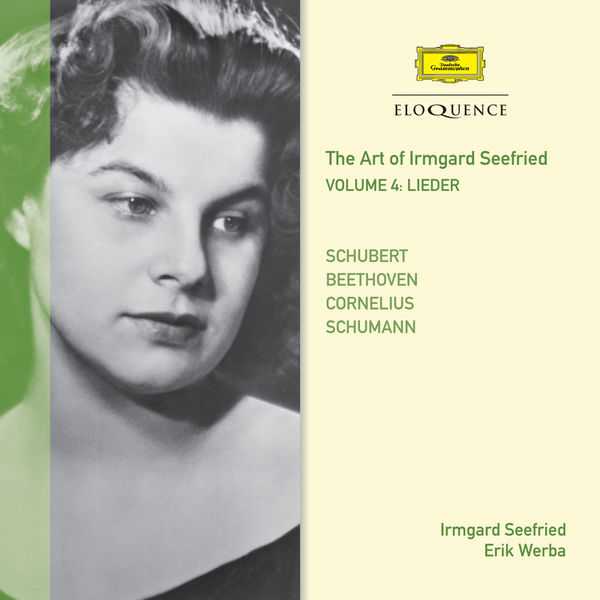
Composer: Ludwig van Beethoven, Peter Cornelius, Franz Peter Schubert, Robert Schumann
Performer: Irmgard Seefried, Erik Werba
Format: FLAC (tracks)
Label: Deutsche Grammophon
Catalogue: ELQ4807230
Release: 2014
Size: 211 MB
Recovery: +3%
Scan: cover
01. Schubert: Ave Maria, D839
Schubert: Incidental music to Rosamunde, D797
02. Romance: “Der Vollmond strahlt auf Bergeshöh’n”
03. Schubert: Seligkeit D433 (Holty)
04. Schubert: Suleika
05. Schubert: Suleika II, D717
06. Schubert: Heidenröslein, D257
07. Schubert: Der König in Thule, D367
08. Schubert: Ganymed, D544 (Goethe)
09. Schubert: Gretchen am Spinnrade, D118
10. Beethoven: Wonne der Wehmut, Op. 83 No. 1
Cornelius: Weihnachtslieder, Op. 8
11. 1. Christbaum
12. 2. Die Hirten
13. 3. Die Könige
14. 4. Simeon
15. 5. Christus der Kinderfreund
16. 6. Christkind
Schumann: Frauenliebe und -leben, Op. 42
17. 1. Seit ich ihn gesehen
18. 2. Er, der Herrlichste von allen
19. 3. Ich kann’s nicht fassen, nicht glauben
20. 4. Du Ring an meinem Finger
21. 5. Helft mir, ihr Schwestern
22. 6. Süsser Freund, du blickest mich verwundert an
23. 7 An meinem Herzen, an meiner Brust
24. 8. Nun hast du mir den ersten Schmerz getan
Schumann: Five Poems of Mary Stuart, Op. 135
25. Abschied von Frankreich
26. Nach der Geburt ihres Sohnes
27. An die Königin Elisabeth
28. Abschied von der Welt
29. Gebet
After Irmgard Seefried’s death in 1988, her contemporary Elisabeth Schwarzkopf – never one to dish out compliments lightly – commented: ‘All of us envied her, because what we had to achieve laboriously worked for her so naturally and as a matter of course, because she knew how to sing from the heart’.
Freshness, spontaneity, natural warmth of feeling, allied to a voice of gleaming beauty and a delightful stage presence: these were the hallmarks of a much-loved soprano who for three decades charmed and moved audiences in the theatre and concert hall, her face as expressive as her voice. As John Steane memorably put it in Gramophone, ‘it was as though she wore her own spotlight’.
Born in the Swabian town of Köngetried in 1919, Seefried was ‘discovered’, aged twenty, by Herbert von Karajan in Aachen, where she made her operatic debut as the Priestess in Aida. In 1943 she sang Eva in Die Meistersinger for the Wiener Staatsoper, initiating an association that lasted until 1976. It was in Strauss and Mozart that Seefried was most admired.
Issued over eleven single-disc volumes, Deutsche Grammophon / Eloquence pays tribute to Irmgard Seefried, bringing back to circulation several recordings that have never previously been issued on CD. The music ranges through opera and oratorio, with an especially generous offering of art song from a range of composers, including Schubert, Schumann, Wolf, Hindemith and Egk. The notes for the series have been written by that leading connoisseur of the voice, Richard Wigmore.
Seefried was no less delightful as a recitalist than she was an opera singer, as can be heard on these recordings of Schubert, Schumann and Cornelius made with Erik Werba, her pianist of choice during the 1950s and ‘60s. In Schubert her naturalness was an invaluable asset: say, in her tender shaping of the exquisite bel canto melody of ‘Ave Maria’ (1825), Ellen’s prayer to the Virgin from Walter Scott’s The Lady of the Lake, or the charm, without winsomeness, she brings to Goethe’s wryly insouciant tale of blighted innocence, ‘Heidenröslein’.
Her gift of candid simplicity is enchantingly heard in Peter Cornelius’s artless Weihnachtslieder. Any singer of Frauenliebe und -leben must avoid mawkishness and convey a journey from dazed innocence through incredulity, excitement and joy in motherhood, to numbness in bereavement. Seefried’s distinctive timbre, combining the freshness of youth with a glowing warmth, gives her a head start. Beyond this, she experiences the cycle so vividly that, for its duration, hers seems the only possible way. Here, as in the Gedichte der Maria Stuart, we have singing of passionate immediacy and eloquently exploiting the hints of mezzo depth within her luminous soprano.